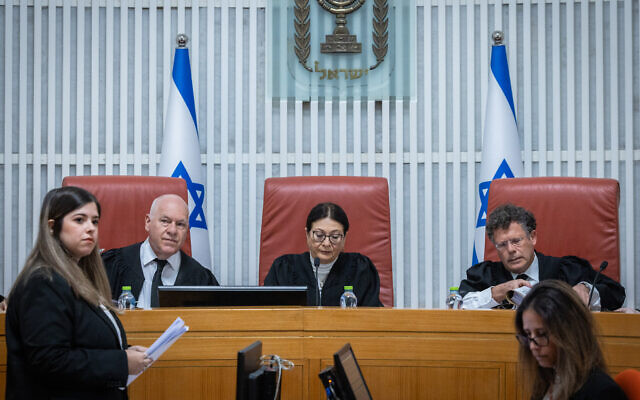Levin, Netanyahu said to seek further changes that would redefine High Court-Knesset balance of power, limit Israelis’ right to petition against government actions
Today, 3:27 pm
 Incoming Prime Minister Benjamin Netanyahu (right) speaks with incoming Justice Minister Yariv Levin during a vote for the new Knesset speaker in the Knesset on December 13, 2022. (Yonatan Sindel/ Flash90)[/caption]
Incoming Prime Minister Benjamin Netanyahu (right) speaks with incoming Justice Minister Yariv Levin during a vote for the new Knesset speaker in the Knesset on December 13, 2022. (Yonatan Sindel/ Flash90)[/caption]
The new government’s far-reaching plan to overhaul the judiciary is reportedly just the first step out of four, with additional plans including splitting the attorney general’s role, limiting the ability to petition against government actions, and major changes to the quasi-constitutional Basic Laws to reshape the balance of power between the Knesset and the High Court of Justice.
The additional planned measures were presented in recent days to a small number of ministers, including Prime Minister Benjamin Netanyahu, during a meeting at the Likud party’s headquarters in the Metzudat Ze’ev office building in Tel Aviv, the Haaretz daily reported Sunday, without citing a source.
The report said the coalition aims to quickly pass into law the first, publicly unveiled phase of the plan by early April.
This includes severely restricting the High Court’s capacity to strike down laws and government decisions, with an “override clause” enabling the Knesset to re-legislate struck-down laws with a bare majority of 61; giving the government complete control over the selection of judges; preventing the court from using a test of “reasonableness” to judge legislation and government decisions; and allowing ministers to appoint their own legal advisers, instead of getting counsel from advisers operating under the aegis of the Justice Ministry.
The plan has drawn intense criticism, even from longtime proponents of judicial reform, and has sparked weekly mass protests and public petitions by various officials, professionals, private companies and other bodies.
Haaretz said the first phase comprises the most significant changes, which form the basis for the others.
Basic Law rejiggering
The second phase, which Levin and Netanyahu reportedly aim to advance during the Knesset’s summer session later this year, would entail radical changes to the quasi-constitutional Basic Laws, downgrading a key law safeguarding human rights and legislating a new Basic Law regulating the status of laws, the High Court’s authority to strike them down, and the Knesset’s ability to overcome such rulings, the report said.
This new Basic Law, which would be based on an identical law bill filed by Levin in the previous Knesset, would make it harder to legislate other Basic Laws, requiring such laws to pass four Knesset plenum votes — three readings as is the situation today, plus another reading in the following Knesset.

Supreme Court President Esther Hayut and other justices at a hearing of the High Court of Justice on petitions against the appointment of Shas party leader Aryeh Deri as a minister due to his recent conviction for tax offenses, January 5, 2023. (Yonatan Sindel/Flash90)
It would also stipulate that all Basic Laws previously enacted with the support of fewer than 61 lawmakers will retroactively become regular laws.
That would only target one law — Basic Law: Human Dignity and Liberty, which was legislated in a 32-21 vote in 1992. It is the law that formed the basis for former chief justice Aharon Barak’s so-called judicial revolution, which allowed the High Court to strike down laws passed by the Knesset.
Netanyahu and Levin are considering legislating a new Basic Law enshrining human rights, which doesn’t include the clause in the existing Basic Law that was later used by the High Court as the basis for striking down laws, the report said.
Limiting High Court standing
The third phase would greatly limit Israelis’ right to file High Court petitions against government decisions, the report said.
While the court has in recent decades broadened the locus standi, enabling private citizens and bodies to file petitions, the government is reportedly seeking to pass legislation defining specific conditions for doing so — including requiring the petitioner to be the main victim of the step they are petitioning against.
Splitting attorney general’s role
The fourth and final phase — which the report said is the most politically sensitive and has only been discussed in general terms — would split the role of attorney general, who currently also serves as legal adviser to the government.
Critics have argued for years that the dual role creates an inherent conflict of interest when deciding whether to file an indictment against a member of the government.
The report said that while the details aren’t yet clear, one possibility is to have the government appoint a separate attorney general responsible for deciding on indicting members of the government.
Taking such steps while an ongoing corruption trial is being held against Netanyahu carries the potential for giving such a new official the power to reconsider the entire trial, which would draw even more intense public backlash and could end with Attorney General Gali Baharav-Miara ordering Netanyahu to take a leave of absence over breach of conflict of interest rules.
This phase is therefore shrouded in uncertainty, and the splitting could end up going ahead without any power to affect Netanyahu’s trial, the report said.



How about term limits for prime ministers?
How about term limits for judges?